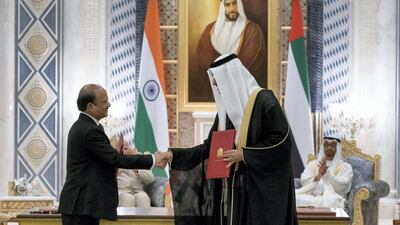Abu Dhabi has awarded a 10 per cent interest in its Lower Zakum offshore concession to a consortium of Indian companies in a Dh2.2 billion deal that marks the first hydrocarbon rights agreement between the emirate and a country that is forecast to become the world’s fastest-growing oil consumer.
The 40-year agreement is expected to be the first of several announcements this year related to the renewal of the Adma-Opco concession, dating back to 1953, which expires next month.
Dr Sultan Al Jaber, the chief executive of the Abu Dhabi National Oil Company, which is the major shareholder in the concession, said that the “mutually beneficial partnership will help India meet its growing demand for energy and refined products” as well as help his company to increase its market share in a key growth market.
The current Adma-Opco concession, comprising the fields Umm Shaif, Nasr, Umm Lulu and Satah Al Razboot (Sarb), as well as Lower Zakum, has been split into three, with Adnoc retaining a 60 per cent shareholding in each.
_______________
Read more:
Adnoc opens up for more partnerships in new era
Adnoc in talks with energy companies over renewal of major offshore oil concession
_______________
Umm Shaif and Nasr will form the second concession and Sarb and Umm Lulu the third. Adnoc said it “is finalising opportunities with potential partners” for the remainder of the stake available for foreign oil and gas companies in Lower Zakum.
The new structure and terms will accommodate a greater number of strategic partners bringing in technology, expertise and value. This is part of Adnoc’s transformation under chief executive Dr Al Jaber, as it drives growth and boosts revenue creation.
The Indian consortium is led by the international arm of the state-owned Oil and Natural Gas Corporation (ONGC) and includes Indian Oil and Bharat PetroResources.
Shashi Shanker, chairman of the ONGC Group said that the deal with Adnoc reflects the vision of Narendra Modi, the prime minister of India, “towards strengthening hydrocarbon linkages with the UAE on a win-win basis”. The deal was signed during Mr Modi’s visit to Abu Dhabi on Saturday.
Alongside the concession award, Adnoc and the Indian Strategic Petroleum Reserves Ltd, a government-owned company mandated to store crude for strategic needs, agreed to implement a previously announced deal, giving the Abu Dhabi producer access to a storage facility in the southern city of Mangalore, which has a capacity of nearly 6 million barrels of crude.
The strategic storage tie-up had been announced during the visit to India of Sheikh Mohammed bin Zayed, Crown Prince of Abu Dhabi and Deputy Supreme Commander of the Armed Forces, in January of last year. At the time, Sheikh Mohammed and Mr Modi said they expected further energy sector investments as part of discussions that first began with Mr Modi’s visit to the UAE in late 2015.
On Saturday Mr Modi said that the offshore concession deal he was “happy to note that we have progressed from a buyer-seller relationship to an era of mutual investments in the oil and gas sector”. He and Sheikh Mohammed attended the signing ceremony for the agreement in the capital.
India imports about 80 per cent of its energy requirements – the UAE supplies about 8 per cent of this need – and also has plans to significantly expand its downstream production capacity. The oil storage facility will both help ensure India’s energy security and give Adnoc the ability to efficiently and competitively meet market demand in India and across the fast developing south east Asian economies.


